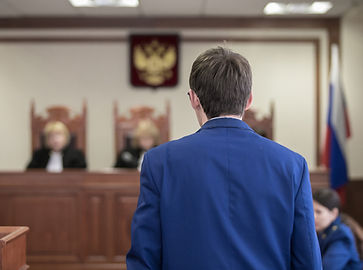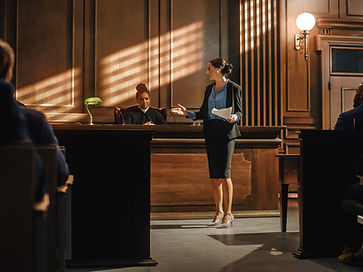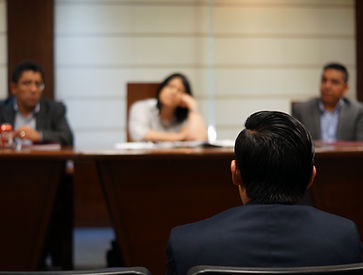
PUBLISHED ARTICLES
LET JUSTICE PREVAIL
ABOUT
With a wealth of experience, Mr. Galasso has contributed extensively to legal discourse through a collection of thought-provoking articles. We urge that you delve into his diverse array of topics, including child custody, business valuation in divorce, equitable distribution, and more. We also encourage you to explore the nuanced perspectives and practical insights that characterize Mr. Galasso's articles, offering valuable perspectives for both legal practitioners and individuals navigating the complexities of family law matters.
TOPICS
ALL ARTICLES


Author: Peter J. Galasso
Published: July 29, 2025 - New York Law Journal
This article has already drawn a great deal of attention from the Matrimonial Bar because attorneys and trial judges alike are frustrated by the lack of guidance they receive from the decisions rendered and written by the Appellate Division. Peter explains how the absence of a detailed explanation for its decisions has often led to a division in the Judicial departments on a valuation date issue that can have profound financial consequences.

Author: Peter J. Galasso
Published: December 7, 2023 - New York Law Journal
Peter Galasso argues that appointing Attorneys for Children (AFCs) to represent non-communicative toddlers in custody disputes is misguided and legally unsound. Since toddlers cannot articulate their preferences, AFCs end up substituting their own opinions, undermining the purpose of the law, which is to give children a voice in custody proceedings. This practice not only risks judicial impropriety but also imposes unnecessary financial burdens on parents or the state. Galasso calls for courts to stop appointing AFCs in such cases unless a child can meaningfully express their wishes, emphasizing fiscal responsibility and judicial integrity.

Author: Peter J. Galasso
Published: March 16, 2023 - New York Law Journal
In his most recently published op-ed in the New York Law Journal dated March 16, 2023, Peter propounds that when a child is the victim of parental alienation, the child’s rights and voice may be insidiously muted by the time of trial, which Peter argues urgently necessitates a judge’s preemptive intervention at an in-camera conference.




Authors: Peter J. Galasso, Esq. & Joel A. Rakower, CPANew York State Bar AssociationPracticing Matrimonial and Family Law in Chaotic Economic Times Part IIThis publication was promulgated to members of the New York State Bar Association who attended the statewide continuing legal education lecture series about business valuation, which Peter spearheaded with this thoughtful guide for attorneys to follow in navigating their way through the valuation process.




Author: Peter Galasso
The New York Law Journal
Occasionally, the Appellate Division, Second Department, speaks with illuminating clarity. In Palydowycz v. Palydowycz (NYLJ, April 14), it did just that. In doing so, it had to overturn the contrary precedent established in 2010 by an appellate panel composed of its very own members. As Peter explains, in deciding Palydowycz, the Second Department abandoned a fundamentally logical and commonsensical rule of law that it had embraced for the prior six years. Significant to the divorcing business owners out there, their maintenance payments under Payldowycz are likely to be far greater. To the maintenance payee counterpart, Palydowycz is a cause for celebration.

Author: Peter Galasso
New York Law Journal
Volume 244
Copyright 2010 ALM Media Properties, LLC
Thursday, November 18, 2010
In this article, Peter explains that in selecting a proper valuation date for an active business asset that needs to be equitably distributed as an incident to a divorce, judges and matrimonial practitioners alike must now recognize they can no longer rigidly apply archaic law to our incontrovertibly new, unpredictable, and often volatile economic times.

Author: Peter Galasso, Jeffrey L. Catterson, and Joel Rakower
NYSBA Family Law Review | Winter 2008 | Vol. 40 | No. 4
Exhaustive scholarly analyses on the double-dipping, or double-counting, phenomenon have adorned the pages of various legal publications since its initial recognition in McSparron v. McSparron. As we all know, in McSparron, the Court of Appeals held that maintenance awards are not to be drawn from the income stream that was relied upon in the calculation of the value of an equitably distributed marital asset.
Author: Peter Galasso
New York Law Journal
Volume 239
Copyright 2008 ALM Properties, Inc. All rights reserved.
Monday, February 25, 2008
In 2008, an unscrupulous New York monied spouse planned to divorce. Peter argued that he should first convince his wife to relocate the family to Connecticut, where child support terminates when the child reaches 18 rather than 21, which is the age of termination in New York.


Author: Peter Galasso
New York Law Journal
Copyright 2006
Friday, September 15, 2006
Peter argues that the slippery slope of egregious fault, which Justice Jacqueline Silbermann expanded from the nearly homicidal conduct depicted in Havell v. Islam, 186 Misc. 2d 726, to the simply unacceptable conduct observed in DeSilva v. DeSilva is an inherently dangerous and misguided precedent which should be universally rebuked rather than lauded by the matrimonial bar.

Author: Peter Galasso
New York Law Journal
Volume 235
Copyright 2006 ALM Properties, Inc. All rights reserved.
Tuesday, January 10, 2006
At a bench trial, which is a judge's main stage in matrimonials, Peter contends that the prohibition against leading questions of a witness-proponent has become an anachronism.


Author: Peter Galasso
NYSBA Family Law Review
Vol. 36 No. 2
Fall 2004
Reminded of Justice Potter Stewart's now and forever famous definition of pornography, "...I know it
when I see it..." Peter's opinion is that, beyond the obvious, judges tend to find marital waste only
when they smell it. With that in mind, this article is intended as a quick refresher on the confounding
world of marital waste.

Author: Peter Galasso
New York Law Journal
Letters to the Editor
Tuesday, February 4, 2003
Peter offers kudos to Timothy M. Tippins for his cutting-edge insights into the inequities endorsed by a confused judiciary over its application of the Child Support Standards Act (NYLJ, Jan. 15 and 16, page 4). Indeed, in those cases involving a license or practice distribution, the judiciary's oppressive disregard of the actual arithmetic that predicates its awards is daunting.


Author: Peter Galasso
New York Law Journal
Volume 230
Monday, October 20, 2003
If the courts were to adopt the thinking of Philip C. Siegel and Larry A. Cohen, as articulated in their article encouraging 'Forensic Assessments in Custodial Relocation Cases' (NYLJ, Aug. 13, 2003), the cost of virtually every relocation may prove to be too exorbitant for the potentially relocating parent to even bother. Peter argues that
contrary to the authors' view of the world, not every relocation case should ignite a full-blown forensic work-up.


Author: Peter Galasso and Elayne E. Greenberg
New York Law Journal
Copyright 2000
Friday, November 3, 2000
The standards for reviewing applications to set aside the parties' marital agreement have been firmly implanted in the minds of all matrimonial practitioners by the Court of Appeals' seminal decision in Christian v. Christian.

"Author: Peter Galasso
New York Law Journal: Wednesday, July 12, 2000
Letter To The Editor
As a matrimonial lawyer, Peter is a huge believer that something must be done to obviate the “climate of incivility” in the courtroom. However, Peter argues here that Judge Bruce Balter and Michael J. Simone's article (Aug. 25), “How Judges Can Enforce Civility By Punishing Frivolous Conduct” (NYLJ, page 1) is certainly not the answer. Not only is the
line in the sand that separates frivolity from creative lawyering nearly indiscernible, it is the very reason why there are so few reported decisions on that issue. Today's allegedly frivolous argument is not so infrequently tomorrow's laws.


Author: Peter Galasso
New York Law Journal, Volume 220, Number 45
Copyright 1998 by the New York Law Publishing Company
Wednesday, September 2, 1998
Stanley S. Arkin's June 8 article exploring the “Line Between ‘Negotiation and Extortion’ ” struck a chord familiar to many of us who practice matrimonial law. In virtually every divorce, something peculiar, embarrassing, or downright humiliating about one of the parties can potentially become the focal point of an advocate's attack.

Author: Peter Galasso
New York Law Journal
New York Law Publishing Company
Friday, January 3, 1997
MONEY IS POWER. Not unexpectedly, its redistribution shifts the balance of that power. Historically, the government's primary tools for reallocating wealth had been confined to changes in the tax laws and affirmative action initiatives. Peter explains how the Domestic Relations Law has supplemented those tools.


Author: Peter Galasso
New York Law Journal
Copyright 1996
August 6, 1996
Letters: To the Editor
While the "court is not a rubber stamp and [its] role in ensuring that the interests of infant plaintiffs are fully protected is one of the more serious responsibilities presented to the courts. Peter argues that the Court should leave decisions about how a parent should settle a child's personal injury award to the child's parents.

Author: Peter Galasso
New York Law Journal
Copyright 1995 by The New York Law Publishing Company
Volume 214-NO.53
Thursday, September 14, 1995
Peter contends here that the admission of the testimony of a health care professional that "validates" a toddler's
sex abuse allegations should be forbidden.

Author: Peter Galasso
To the Editor, New York Law Journal
Copyright 1995 by The New York Law Publishing Company
Thursday, June 8. 1995
Lost in the recent "Family and the Law" column (NYLJ May 10) analyzing the Court of Appeals' decision in Cassano v. Cassano is the head-shaking astonishment of most matrimonial practitioners over the absence of a nexus between a non-custodial parent's child support obligation and the child's actual need in applying the Child Support Standard Act.

Author: Peter Galasso
New York Law Journal
Copyright 1994 by The New York Law Publishing Company
Wednesday, November 23, 1994
Peter argues that before all hope of arbitrating custody and visitation is lost in the popular discourse of "public policy",
"parens patriae", and a "child's best interests", the pragmatic voices of the parents affected thereby,
and who are constitutionally empowered to make the day-to-day decisions involving their children
must be heard.

Author: Peter Galasso
New York Law Journal
Volume 211, Number 82
Copyright 1994 by The New York Law Publishing Company
Friday, April 29, 1994
Peter contends in this article that in an intact family with parents, who decide that their child or children should not be compelled to visit with their grandparents under DRL§ 72.


